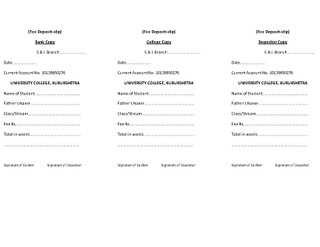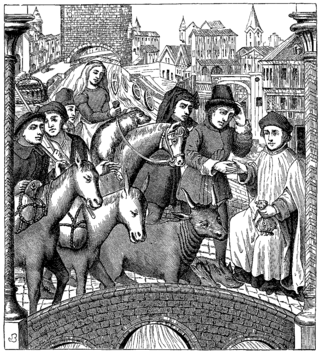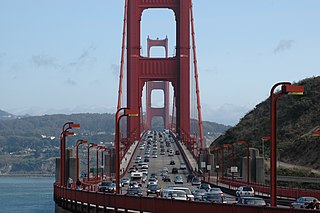
Transport economics is a branch of economics founded in 1959 by American economist John R. Meyer that deals with the allocation of resources within the transport sector. It has strong links to civil engineering. Transport economics differs from some other branches of economics in that the assumption of a spaceless, instantaneous economy does not hold. People and goods flow over networks at certain speeds. Demands peak. Advance ticket purchase is often induced by lower fares. The networks themselves may or may not be competitive. A single trip may require the bundling of services provided by several firms, agencies and modes.

A toll road, also known as a turnpike or tollway, is a public or private road for which a fee is assessed for passage. It is a form of road pricing typically implemented to help recoup the costs of road construction and maintenance.

Congestion pricing or congestion charges is a system of surcharging users of public goods that are subject to congestion through excess demand, such as through higher peak charges for use of bus services, electricity, metros, railways, telephones, and road pricing to reduce traffic congestion; airlines and shipping companies may be charged higher fees for slots at airports and through canals at busy times. Advocates claim this pricing strategy regulates demand, making it possible to manage congestion without increasing supply.

Parking is the act of stopping and disengaging a vehicle and usually leaving it unoccupied. Parking on one or both sides of a road is often permitted, though sometimes with restrictions. Some buildings have parking facilities for use of the buildings' users. Countries and local governments have rules for design and use of parking spaces.

A fee is the price one pays as remuneration for rights or services. Fees usually allow for overhead, wages, costs, and markup. Traditionally, professionals in the United Kingdom receive a fee in contradistinction to a payment, salary, or wage, and often use guineas rather than pounds as units of account. Under the feudal system, a Knight's fee was what was given to a knight for his service, usually the usage of land. A contingent fee is an attorney's fee which is reduced or not charged at all if the court case is lost by the attorney.

Since the start of the twentieth century, the role of cars has become highly important, though controversial. They are used throughout the world and have become the most popular mode of transport in many of the more developed countries. In developing countries cars are fewer and the effects of the car on society are less visible, however they are nonetheless significant. The development of the car built upon the transport sector first started by railways and bicycles. They introduced sweeping changes in employment patterns, social interactions, infrastructure and the distribution of goods.

A toll bridge is a bridge where a monetary charge is required to pass over. Generally the private or public owner, builder and maintainer of the bridge uses the toll to recoup their investment, in much the same way as a toll road.
A fuel tax is an excise tax imposed on the sale of fuel. In most countries the fuel tax is imposed on fuels which are intended for transportation. Fuel tax receipts are often dedicated or hypothecated to transportation projects, in which case the fuel tax can be considered a user fee. In other countries, the fuel tax is a source of general revenue. Sometimes, a fuel tax is used as an ecotax, to promote ecological sustainability. Fuel taxes are often considered by government agencies such as the Internal Revenue Service as regressive taxes.

Electronic toll collection (ETC) is a wireless system to automatically collect the usage fee or toll charged to vehicles using toll roads, HOV lanes, toll bridges, and toll tunnels. It is a faster alternative which is replacing toll booths, where vehicles must stop and the driver manually pays the toll with cash or a card. In most systems, vehicles using the system are equipped with an automated radio transponder device. When the vehicle passes a roadside toll reader device, a radio signal from the reader triggers the transponder, which transmits back an identifying number which registers the vehicle's use of the road, and an electronic payment system charges the user the toll.
E-ZPass is an electronic toll collection system used on toll roads, toll bridges, and toll tunnels in the Eastern United States, Midwestern United States, and Southern United States. The E-ZPass Interagency Group (IAG) consists of member agencies in several states, which use the same technology and allow travelers to use the same transponder on toll roads throughout the network.
Excise tax in the United States is an indirect tax on listed items. Excise taxes can be and are made by federal, state, and local governments and are not uniform throughout the United States. Certain goods, such as gasoline, diesel fuel, alcohol, and tobacco products, are taxed by multiple governments simultaneously. Some excise taxes are collected from the producer or retailer and not paid directly by the consumer, and as such, often remain "hidden" in the price of a product or service rather than being listed separately.

Touch 'n Go is a contactless smart card system used for electronic payments in Malaysia. The system was introduced in 1997 and is widely used for toll payments on highways, public transportation, parking, and other services. The card is equipped with a radio-frequency identification (RFID) chip that allows users to make payments by simply tapping the card on a reader device. Touch 'n Go cards can be reloaded with funds either online or at designated reload kiosks. The system has become a popular and convenient way for Malaysians to make cashless transactions.
The Maryland Transportation Authority (MDTA) is an independent state agency responsible for financing, constructing, operating, and maintaining eight transportation facilities, currently consisting of two toll roads, two tunnels, and four bridges in Maryland. It also provides the Maryland Department of Transportation with financing for other revenue producing transportation projects.

Motoring taxation in the United Kingdom consists primarily of vehicle excise duty, which is levied on vehicles registered in the UK, and hydrocarbon oil duty, which is levied on the fuel used by motor vehicles. VED and fuel tax raised approximately £32 billion in 2009, a further £4 billion was raised from the value added tax on fuel purchases. Motoring-related taxes for fiscal year 2011/12, including fuel duties and VED, are estimated to amount to more than £38 billion, representing almost 7% of total UK taxation.
An employer in the United States may provide transportation benefits to their employees that are tax free up to a certain limit. Under the U.S. Internal Revenue Code section 132(a), the qualified transportation benefits are one of the eight types of statutory employee benefits that are excluded from gross income in calculating federal income tax. The qualified transportation benefits are transit passes, vanpooling, bicycling, and parking associated with these things.

The United States federal excise tax on gasoline is 18.4 cents per gallon and 24.4 cents per gallon for diesel fuel. Proceeds from the tax partly support the Highway Trust Fund. The federal tax was last raised on October 1, 1993, and is not indexed to inflation, which increased 111% from Oct. 1993 until Dec. 2023. On average, as of April 2019, state and local taxes and fees add 34.24 cents to gasoline and 35.89 cents to diesel, for a total US volume-weighted average fuel tax of 52.64 cents per gallon for gas and 60.29 cents per gallon for diesel.

San Francisco congestion pricing is a proposed traffic congestion user fee for vehicles traveling into the most congested areas of the city of San Francisco at certain periods of peak demand. The charge would be combined with other traffic reduction projects. The proposed congestion pricing charge is part of a mobility and pricing study being carried out by the San Francisco County Transportation Authority (SFCTA) to reduce congestion at and near central locations and to reduce its associated environmental impacts, including cutting greenhouse gas emissions. The funds raised through the charge will be used for public transit improvement projects, and for pedestrian and bike infrastructure and enhancements.
A vehicle miles traveled tax, also frequently referred to as a VMT tax, VMT fee, mileage-based fee, or road user charge, is a policy of charging motorists based on how many miles they have traveled.
The benefit principle is a concept in the theory of taxation from public finance. It bases taxes to pay for public-goods expenditures on a politically-revealed willingness to pay for benefits received. The principle is sometimes likened to the function of prices in allocating private goods. In its use for assessing the efficiency of taxes and appraising fiscal policy, the benefit approach was initially developed by Knut Wicksell (1896) and Erik Lindahl (1919), two economists of the Stockholm School. Wicksell's near-unanimity formulation of the principle was premised on a just income distribution. The approach was extended in the work of Paul Samuelson, Richard Musgrave, and others. It has also been applied to such subjects as tax progressivity, corporation taxes, and taxes on property or wealth. The unanimity-rule aspect of Wicksell's approach in linking taxes and expenditures is cited as a point of departure for the study of constitutional economics in the work of James Buchanan.












